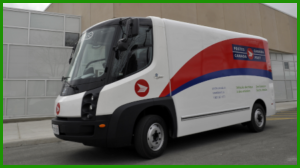
Wednesday June 15 2022
CPC commits to net zero emissions by 2050; work of the Union helped pushed to act now
CCanada Post is finally addressing climate change and the role it must play in saving our planet. Last week, Canada Post CEO Doug Ettinger officially announced the Corporation’s commitment to transform its corporately owned fleet of 14,000 vehicles to fully electric by 2040 and putting Canada Post on a path to net zero emissions by 2050.
This is a welcome announcement and a testament to the dedicated and devoted work of the Union to push Canada Post to address its own greenhouse gas emissions footprint. CUPW has advocated for many years, through the Delivering Community Power campaign, and our work on the Environment Committee and Appendix T, for Canada Post to be a leader in fighting climate change, while creating good, green, unionized jobs, and providing necessary services in all corners of the country. In his address, Canada Post CEO Doug Ettinger thanked the bargaining agents for their continued engagement and collaboration on this crucial step.
Zero Emissions Vehicles
The Corporation’s vehicle fleet will be transformed to non-emitting transportation, with commitments to 50 per cent electric by 2030, and 100 per cent electric by 2040. It’s time that Canada Post leveraged its huge fleet and led the way in emissions reductions. Canada currently lags behind other countries in electric vehicle adoption, accounting for only 3 per cent of new car sales. A green transition requires large-scale public investment in renewables and putting one of our largest public infrastructures at the center of the transformation is critical.

Science Based Targets
Canada Post also committed to a 50 per cent reduction in greenhouse gas emissions by 2030 to meet the 1.5-degree pathway of the Science Based Targets initiative (SBTi) which aims to limit global warming to 1.5 degrees above pre-industrial levels. This target would set Canada Post on a path to net zero emissions by 2050, but only for Scope 1 and 2 emissions. RSMC vehicle emissions are currently contained in Scope 3, where they aren’t counted towards CPC’s direct GHG emissions. Scope 3 emissions account for 88 per cent of the Corporation’s emissions. To truly tackle climate change, CUPW believes RSMC vehicles should be included in Scope 1. See bulletin #291 for more information.
Transforming National Operations
While electrifying the fleet is a great beginning, Canada Post has more buildings and assets that can also be transformed to help green the planet. As part of its commitment to net zero emissions, the Corporation announced it would retrofit buildings, new buildings would be net zero carbon, and that it would source renewal energy for real estate and operations. CUPW will continue to monitor these commitments, as the Union believes that any consideration of carbon offsets are not reasonable solutions to the Corporation’s GHG footprint.
The Job Isn’t Done
The details of Canada Post’s announcement read right from the Delivering Community Power plan, and while this news is a good first step, our job is far from over. Our plans are much bigger. We want employee and public access to electric vehicle charging stations at every Canada Post location in the country, we want new vehicle manufacturing, chip, and battery development to be made by unionized workers, right here in Canada, creating good, unionized green jobs, we want our mechanics to be trained to fix these new vehicles, and so much more.
Canada Post made a commitment, but we will make sure they follow through. We will hold them accountable to the commitments they’ve made and push them to do even more.
CUPW National Policies
The Union has strong policies contained in the National Constitution which call for principled actions of the Union and members to protect the planet. To find out more about these policies or the demands of Delivering Community Power, please sign up for eDigest.
